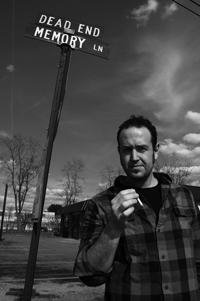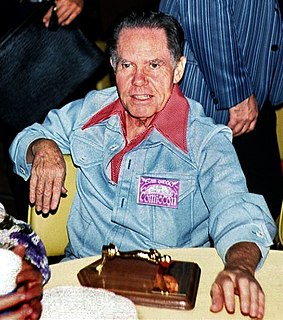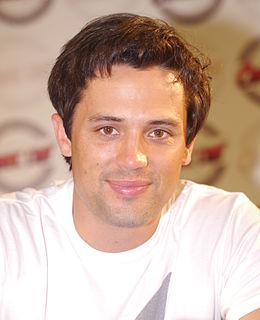Top 281 Recreate Quotes & Sayings - Page 5
Explore popular Recreate quotes.
Last updated on April 21, 2025.
Why, friends, you go to do you know not what: Wherein hath Caesar thus deserved your loves? Alas, you know not: I must tell you then: You have forgot the will I told you of. . . . . Here is the will, and under Caesar's seal. To every Roman citizen he gives, To every several man, seventy-five drachmas. . . . . Moreover, he hath left you all his walks, His private arbours and new-planted orchards, On this side Tiber; he hath left them you, And to your heirs for ever, common pleasures, To walk abroad, and recreate yourselves. Here was a Caesar! when comes such another?
It kind of depresses me when people decide to move away. I get it, you want your kids to have somewhere to roam free or to recreate whatever your sort of childhood ideal was, but my kids are grand. I love LA because lifestyle wise, it's near the beach and mountains and it is great for kids but then it's a city built on an industry that, at the end of the day, is kind of facile.
Our way out involves both resistance and renewal: saying no to what is, so that we can reshape and recreate the world. Our challenge is communal, but to face it we must be empowered as individuals and create structures of support and celebration that can teach us freedom. Creation is the ultimate resistance, the ultimate refusal to accept things as they are. For it is in creation that we encounter Mystery.
There are estimates that we daily walked for 10 - 20 kilometers for hundreds of thousands of years. The world's best problem solving machinery grew up under conditions of consistent, strenuous physical activity. It makes sense that when we don't recreate the environments in which the organ was forged, we get a loss of function. And that when we do restore those environments, we get that function back. The effects of aerobic exercise on executive function skills is a powerful empirical example of this idea.
The theme of corporate stories (and millions drink them in every day) seldom varies: to be happy you must consume, to be special you must conform. Absurd, obviously, yet our identities have become so fragile, so elusive, that we seem content to let advertisers provide us with their version of who we are, to let them recreate us in their image: a cookie-cutter image based on market research, shallow sociology, and insidious lies.
The situation they [journalists and Edward Snowden] were in was incredibly heightened. The stakes were high. There was a lot of pressure, a lot of tension, a lot of sense of claustrophobic, clandestine energy that I think was exhilarating for us to explore and recreate. We were fortunate to shoot a fair amount of our stuff at the actual hotel where it all happened in Hong Kong. That added another element of very similitude to the situation, so I feel like it was exciting.
Neville recommends at the end of every day, before you go to sleep, to think through the events of the day. If any events or moments did not go the way you wanted, replay them in your mind in a way that thrills you. As you recreate those events in your mind exactly as you want, you are cleaning up your frequency from the day and you are emitting a new signal and frequency for tomorrow. You have intentionally created new picture for your future. It is never too late to change the pictures.
I can't really recreate or reconstruct exactly how or from where any of my characters originate, young or old, though chances are at least decent that once I name and begin to know them, young or old, I can then attempt to reveal each as psychologically complex and nuanced, and to speak through them, as William Matthews says, "What it feels like to be human."
What I really love is modern political history. I love the research process, whether it's digging through old newspaper stories, artifacts from election campaigns or TV stories and being able to recreate moments in history that - when you look back at them now - you can get to that question of how did we get here.
Who dreamt and made incarnate gaps in Time & Space through images juxtaposed, and trapped the archangel of the soul between 2 visual images and joined the elemental verbs and set the noun and dash of consciousness together jumping with sensation of Pater Omnipotens Aeterna Deus to recreate the syntax and measure of poor human prose and stand before you speechless and intelligent and shaking with shame
We kept moving forward and didn't try to recreate the past .. the approach to each album was radically different every time. Many bands would have some success and, because they were locked into having a single - something we didn't have to worry about - they had to make sure there was something similar on the next album ... that was never the idea with Led Zeppelin .. the goal was to keep that spark of spontaneity at all times.
The storyteller is deep inside everyone of us. The story-maker is always with us. Let us suppose our world is attacked by war, by the horrors that we all of us easily imagine. Let us suppose floods wash through our cities, the seas rise . . . but the storyteller will be there, for it is our imaginations which shape us, keep us, create us - for good and for ill. It is our stories that will recreate us, when we are torn, hurt, even destroyed. It is the storyteller, the dream-maker, the myth-maker, that is our phoenix, that represents us at our best, and at our most creative.
Sometimes when you write something, you have that day when you start writing and you feel really good, and you start changing it. At the end, it lost the essence. It lost the first idea, the energy that it had, it's going down after every change. And at the end it's something soft and too much rewritten or too much rebuilt that doesn't have the same energy as the beginning. So, I like the first takes because of that, you know. It has that first energy that sometimes it's difficult to recreate.
Dancers work and they work and they work, and they master their skills so far that improvisation just comes flowing out of them. Their natural expression of the best they can possibly be comes out of them because there is no boundary to hold them back... That's the mentality that I'm trying to create, recreate and hold on to forever.
Why one writes is a question I can answer easily, having so often asked it of myself. I believe one writes because one has to create a world in which one can live. I could not live in any of the worlds offered to me - the world of my parents, the world of war, the world of politics. I had to create a world of my own, like a climate, a country, an atmosphere in which I could breathe, reign, and recreate myself when destroyed by living. That, I believe, is the reason for every work of art.
Wherever man exists, he finds the need to redesign, to recreate the world. A more beautiful world, purer, sweeter smelling and more colorful. A garden is probably the spot where the hopes for civilization are best captured. In fact, man defines himself by his garden. My Grandmother standing wordless fifteen minutes Between rows of loganberries, clippers poised in her hand.
The secondary Imagination I consider as an echo of the former, co-existing with the conscious will, yet still as identical with the primary in the kind of its agency, and differing only in degree, and in the mode of its operation. It dissolves, diffuses, dissipates, in order to recreate: or where this process is rendered impossible, yet still at all events it struggles to idealize and to unify. It is essentially vital, even as all objects (as objects) are essentially fixed and dead.
Although there are some parallels to the problems that we're seeing now and what we say back in the '30s, no period is exactly the same. For us to simply recreate what existed back in the '30s in the 21st century, I think would be missing the boat. We've gotta come up with solutions that are true to our times and true to this moment. And that's gonna be our job. I think the basic principle that government has a role to play in kick starting an economy that has ground to a halt is sound.
We're not really taught how to recreate constructively. We need to do more than find diversions; we need to restore and expand ourselves. Our idea of relaxing is all too often to plop down in front of the television set and let its pandering idiocy liquefy our brains. Shutting off the thought process is not rejuvenating; the mind is like a car battery - it recharges by running.
The thing I was up against in documentary films - was trying to get non-actors to convincingly play themselves in a way I'd come to know before the camera started rolling. And many non-actors can't do that convincingly, even if they just have to play themselves - they can't be naturalistic. And I would always want to recreate something I'd witnessed them do or say, and it just would be incredibly difficult because of the fact they weren't actors.
You must continue to go back to the beginning, to the foundation, and question the foundation. Even once you‘ve reached Samadhi you must go back so you can create it at will. Samadhi is the beginning of spiritual growth, not the end. You must always be questioning. Enlightenment comes as an accident at first, then you have to learn to recreate it.
I've also learned to only write songs and melodies that really work for my voice and that I won't have issues doing live. Because you can get really, really comfortable in the comping process: out of five takes, maybe one of those high notes that you struggled to do, nailed it, and then live you're having that challenge of really having to recreate that.
When we want a book exactly like the one we just finished reading, what we really want is to recreate that pleasurable experience--the headlong rush to the last page, the falling into a character's life, the deeper understanding we've gotten of a place or a time, or the feeling of reading words that are put together in a way that causes us to look at the world differently. We need to start thinking about what it is about a book that draws us in, rather than what the book is about.
Healing... is an active and internal process that includes investigating one's attitudes, memories and beliefs with the desire to release all negative patterns that prevent one's full emotional and spiritual recovery. This internal review inevitably leads one to review one's external circumstances in an effort to recreate one's life in a way that serves activation of will - the will to see and accept truths about one's life and how one has used one's energies; and the will to begin to use energy for the creation of love, self-esteem, and health.
Join with the Earth and each other, to bring new life to the land, to restore the waters, to refresh the air, to renew the forests, to care for the plants, to protect the creatures, to celebrate the seas, to rejoice in the sunlight, to sing the song of the stars, to recall our destiny, to renew our spirits, to reinvigorate our bodies, to recreate the human community, to promote justice and peace, to love our children and love one another, to join together as many and diverse expressions of one loving mystery, for the healing of the Earth and the renewal of all life.
I never actually sexually attacked anybody. But I'm a writer, too, and I was always trying to figure out a way to recreate the experience of being this Albert Camus, Stranger-like solitary protagonist character without incriminating myself in any way, like, "Oh, what a perv!" I want to reach out to anybody out there who may have been riding on the train one time when things in their life were completely falling apart and saw a girl's legs in a skirt and it's the last bit of goodness that you can see.
There are two kinds of visual memory: one when you skillfully recreate an image in the laboratory of your mind, with your eyes open (and then I see Annabel in such general terms as: "honey-colored skin," "thin arms," "brown bobbed hair," "long lashes," "big bright mouth"); and the other when you instantly evoke, with shut eyes, on the dark innerside of your eyelids, the objective, absolutely optical replica of a beloved face, a little ghost in natural colors (and this is how I see Lolita).
The director’s task is to recreate life, its movement, its contradictions, its dynamic and conflicts. It is his duty to reveal every iota of the truth he has seen, even if not everyone finds that truth acceptable. Of course an artist can lose his way, but even his mistakes are interesting provided they are sincere. For they represent the reality of his inner life, of the peregrinations and struggle into which the external world has thrown him.
That authentic experience that happens both in the artist and in the audience you can classify as a mystical experience. You can classify it as aesthetic shock, or even a psychedelic experience. Some people seek to recreate that experience through drugs. But the other way that you can do it is through art, and through spectacle. We have those experiences when we go to rock shows, or when we listen to a piece of classical music, or read a particular poem, or see a painting.
Whenever the devil harasses you, seek the company of men or drink more, or joke and talk nonsense, or do some other merry thing. Sometimes we must drink more, sport, recreate ourselves, and even sin a little to spite the devil, so that we leave him no place for troubling our consciences with trifles. We are conquered if we try too conscientiously not to sin at all. So when the devil says to you: do not drink, answer him: I will drink, and right freely, just because you tell me not to.
Some of us are born more than once. Some of us recreate ourselves many times. Ryodan says adaptability is survivability. Ryodan says a lot of stuff. Sometimes I listen, All I know is, every time I open my eyes, my brian kicks on. Something wakes up deep in my belly, and I know I'll do anything it takes... To. Just. Keep. Breathing.
I want you to understand the words. I want you taste the words. I want you to love the words. Because the words are important. But they're only words. You leave them on the paper and you take the thoughts and put them into your mind and then you as an actor recreate them, as if the thoughts had suddenly occurred to you.
I trust microphones, speakers and recordings less and less, and no longer buy into the idea that I can recreate at home, or in my earphones, the experience of hearing live acoustic instruments. The orchestra is already a set of speakers that react differently to each player, each room and each concert - it's that high level of uncertainly and unrepeatability that I like. The music is just soaked into the walls of a room straight from the instruments - and it's a one-off deal. The alternative - left speaker, right speaker - is kind of a compromise.
I never went to college and I was raised in Arkansas so there wasn't a lot of academic language being thrown around my house. We weren't idiots, but I didn't have that access to academic feminism. I had to realize, on my own, that feminism is not just about how far ahead you can get in a job and it isn't about not wearing makeup. It isn't about not watching your waistline. I had to recreate the world entirely.
Working on 'Laguna' was great because just being in production and shooting stuff and having to go back and relive some things, and there were some lines here and there that the producers would want us to say, and just kind of, you're forced to recreate moments, and just working on the show was so much fun.
Her image had passed into his soul for ever and no word had broken the holy silence of his ecstasy. Her eyes had called him and his soul had leaped at the call. To live, to err, to fall, to triumph, to recreate life out of life! A wild angel had appeared to him, the angel of mortal youth and beauty, an envoy from the fair courts of life, to throw open before him in an instant of ecstasy the gates of all the ways of error and glory. On and on and on and on!
There's a song called 'The Lights of My Hometown' that goes back to me growing up a regular kid. I mean, I lived in a town that I loved, but was too small for the dreams I was dreaming. You leave thinking the world has a lot more to offer than your hometown, only to realize years down the road that no matter where you grow up, you will never be able to recreate the innocence and feeling of 'home' anywhere else in the world. No matter who you are, or where that little town is, that's something we all have in common.
My analysis of the situation was that Roman Polanski wasn't trying to break us down or get a performance out of us by destroying us. He was absolutely, very simply, trying to recreate this clear picture in his head. And the pictures he creates are absolutely perfect, and they are exactly what he saw in his head.
Storytelling is one of comics' esthetic hurdles at the moment, which was the novelist's problem 150 years ago: namely, to take comics from storytelling into that of "writing," the major distinction between the two to me being that the former gives one the facts, but the latter tries to recreate the sensation and complexities of life within the fluidity of consciousness and experience. As far as I'm concerned, that's really all I've been trying to do formally for the past decade or more with comics, and it's certainly time-consuming, since it has to be done with drawings, not words.








































